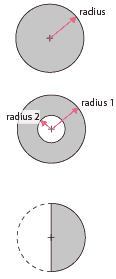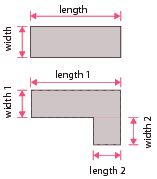Quantity/Volume Calculators for Concrete
(Metric)
These calculators are intended to allow you to calculate the metric volume of concrete required for paths etc.
Three calculators are provided, the first for rectangle areas of concrete, the second for circular areas and the final one for triangular areas.
Rectangular calculator.
Circular calculator.
Triangular calculator.See also our imperial calculators.
Rectangular metric volume calculator
|
For a simple rectangle, just use the length and width with the thickness in the calculator left. For irregular, basically square areas,
|
Circular metric volume calculator
 For a simple circle, just use the radius with the thickness in the calculator left. For a ring:
For part of a circle, calculate the volume for the full circle and then adjust for the part required - i.e. halve for a half circle, quarter for a quarter circle. |
Triangular metric volume calculator
|
For triangular shapes, work out the height and base of the triangle and use with the thickness in the calculator left. The 'height' is the distance between an angle and the opposite side where a line meets the side at right angles. The side it meets is the 'base'. |


